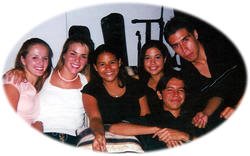
Members of the Christian Student Fellowship at Indiana University
The article was entitled, “Faith and Frat Boys.” It appeared in this year’s May 9th issue of Time Magazine, and it began this way:
“At 3:30 on a Sunday morning, Brandon Straub soberly surveyed the bodies draped across the sofas in his fraternity house at Indiana University. . . .
‘I’d be lying if I didn’t say that seeing some of these scenes makes me sad,’ he said, ‘How will they feel when they wake up in the morning?’
Truth is, most of them wouldn’t be up in the morning. By the time the revelers rose, after noon, Straub, 21, who is not only a loyal fraternity member but also a leader in the Greek InterVarsity Christian Fellowship, had already gone to church and come back. As some of his frat brothers nursed hangovers and others cleaned up from the night before, Straub pondered his situation. He walks a fine line of faith at Indiana, which is currently ranked by the Princeton Review as America’s No. 15 party school (and No. 5 in the category ‘lots of beer’). The challenge, Straub says, is ‘How can I serve God and love the guys here?’”
I think it’s safe to say that Brandon Straub has a very deep appreciation of the parable Jesus told in today’s Gospel reading from Matthew 13—because he’s currently experiencing the reality of this parable firsthand on the campus of Indiana University!
Jesus speaks here about wheat (which symbolizes those who are trying to live as the Lord’s disciples) and weeds (which symbolize those who are living ungodly lives); and he makes it clear that on this earth the wheat and the weeds coexist. They live together and they grow together.
Now what does that mean, practically speaking?
Very simply, it means that as much as you might want to separate yourself from people who tempt you to do wrong and who try to lead you away from Jesus Christ, the fact is you can’t escape them! In one way or another, they will always be around!
So you have to learn to deal with them!—because there’s really no other viable option!
The article in Time Magazine was all about how young Christian college students today are trying to deal with the “weeds” they encounter on their respective campuses. And the article (I’m quite happy to say) made it clear that it can be done! Even at the No. 15 party school in the nation, it’s possible to resist the influence of the weeds and stay on the narrow road that leads to eternal life.
But it’s not magic. There are certain things that all of us—young and not so young—need to do in order to deal effectively with our daily “weeds”.
I’ll share 3 of them with you today.
Number 1: Take responsibility for your spiritual life!
Most of us have no trouble whatsoever taking responsibility for our physical health—because our culture encourages us to do so! When I go to work out, for example, there are almost always 15-20 people in the gym with me. If I had to venture a guess I would say that there are probably not as many people in church at the same hour. Face it, in the modern world it’s extremely easy to neglect your soul these days! But neglecting your soul will make you extremely vulnerable to the influence of the “weeds” around you. That’s because you’re weak—and so am I.
In today’s second reading, St. Paul says, “The Spirit comes to the aid of our weakness”: that’s the good news! But we must actively seek the power of the Spirit by taking responsibility for our spiritual lives: by having a regular, daily prayer time and sticking to it; by being faithful to Mass; and by going to Confession often—especially when we fall into serious sin.
Number 2: If you want to resist the influence of the weeds, make sure you surround yourself with lots of wheat!
In the Time Magazine article there’s a story told about Joshua Hoke, the son of a Protestant minister who’s now a student at Indiana. When Joshua was growing up, he was forced to practice his faith. (When your dad’s the minister, you go to church on Sunday morning whether you want to or not!) So when he first arrived at Indiana in 2002, he decided to see how the other side lived. As he put it, “Christianity wasn’t a choice [at home], and [here] I wanted to do what I wanted to do. The culture of college is, If it feels good, do it.”
So he did “it”: he smoked pot, drank heavily, and even tried cocaine—but it all left him empty. One night in his sophomore year he went for a walk and prayed, “God, are you even on this campus?” At that moment, he had an experience like St. Augustine had just before his conversion: he heard music in the distance, coming from one of the houses on “Greek Row.” He thought it was a band playing in one of the frats, but when he checked it out he discovered that it was a worship team at one of the Christian fellowship houses. Now Joshua Hoke lives in that house with 54 other students who are also trying to take their Christianity seriously.
He’s learning to resist the weeds again, because he’s surrounding himself with lots of wheat.
Where’s the wheat in your life? Or maybe I should ask, Who are the stalks of wheat who help you to resist the weeds every day?
And finally, number 3: Be honest with yourself.
If Brandon Straub—the young man I mentioned at the beginning of my homily, who’s a practicing Christian living in a wild frat house at Indiana University—if he began at some point to do the things his frat brothers do every Saturday night, hopefully he would be honest with himself and say, “I need to get out of here, before I become just like them!” So far, he’s managed to remain true to what he believes in—and that’s great. But he might begin to weaken at some point in the future—perhaps in the midst of a big trial or disappointment—and the temptation will be for him to deny that he’s in any spiritual danger: “I’ll be alright. I can handle it. I’m not going to fall.”
Beware of that kind of self-deception! It can turn you into a weed before you know it!
I remember when Brian Sistare (now Fr. Juniper) had his conversion many years ago. In the first months after he gave his life to Christ he continued to go to parties with his old friends. He didn’t go to drink; he went so that he could be a positive influence on his old drinking buddies. And to some extent, he succeeded. But it soon became apparent to him that he couldn’t continue to do this without being influenced in a negative way by them. Thankfully, he was honest with himself and admitted his weakness.
So what did he do? Well, very simply, he turned these old friends into “casual acquaintances”. He didn’t eliminate them from his life completely, but he did stop hanging around with them in the same way that he had before his conversion. And he was much better off because of it.
Are we prepared to be as honest with ourselves in similar situations? Hopefully we are.
So there you have it—3 ways to deal with the ever-present weeds of human existence: #1 take responsibility for your spiritual life; #2 surround yourself with lots of wheat; and #3 always be honest with yourself.
Jesus concludes this parable by saying that in the end, the weeds will be cast into the fiery furnace, while “the righteous will shine like the sun in the kingdom of the Father”. In the words of last week’s Steubenville conference, Jesus is saying that the righteous—the wheat—will “experience the glory”—not just for a few moments, not just for a weekend, not just for 4 years of college, but forever!
May that thought inspire us all to “be” the Lord’s wheat, and to deal effectively with the many, many weeds that surround us.
